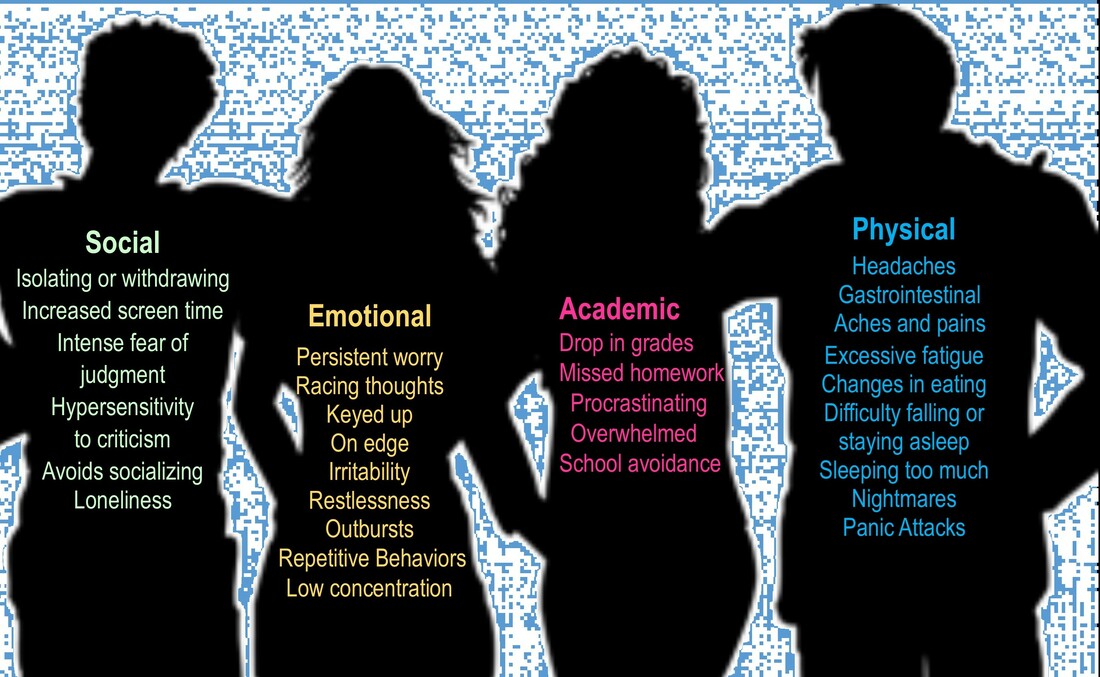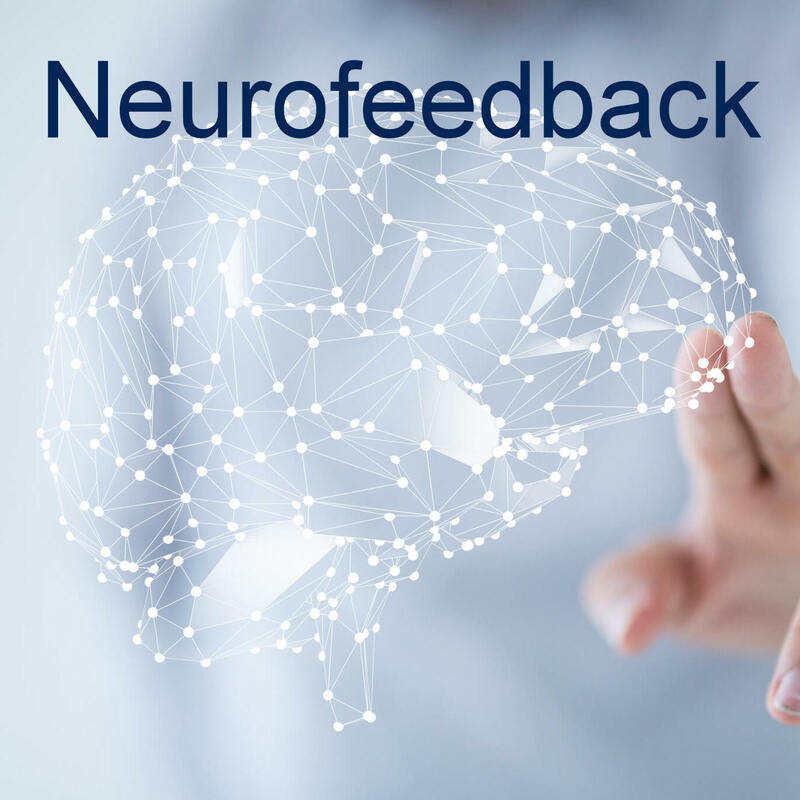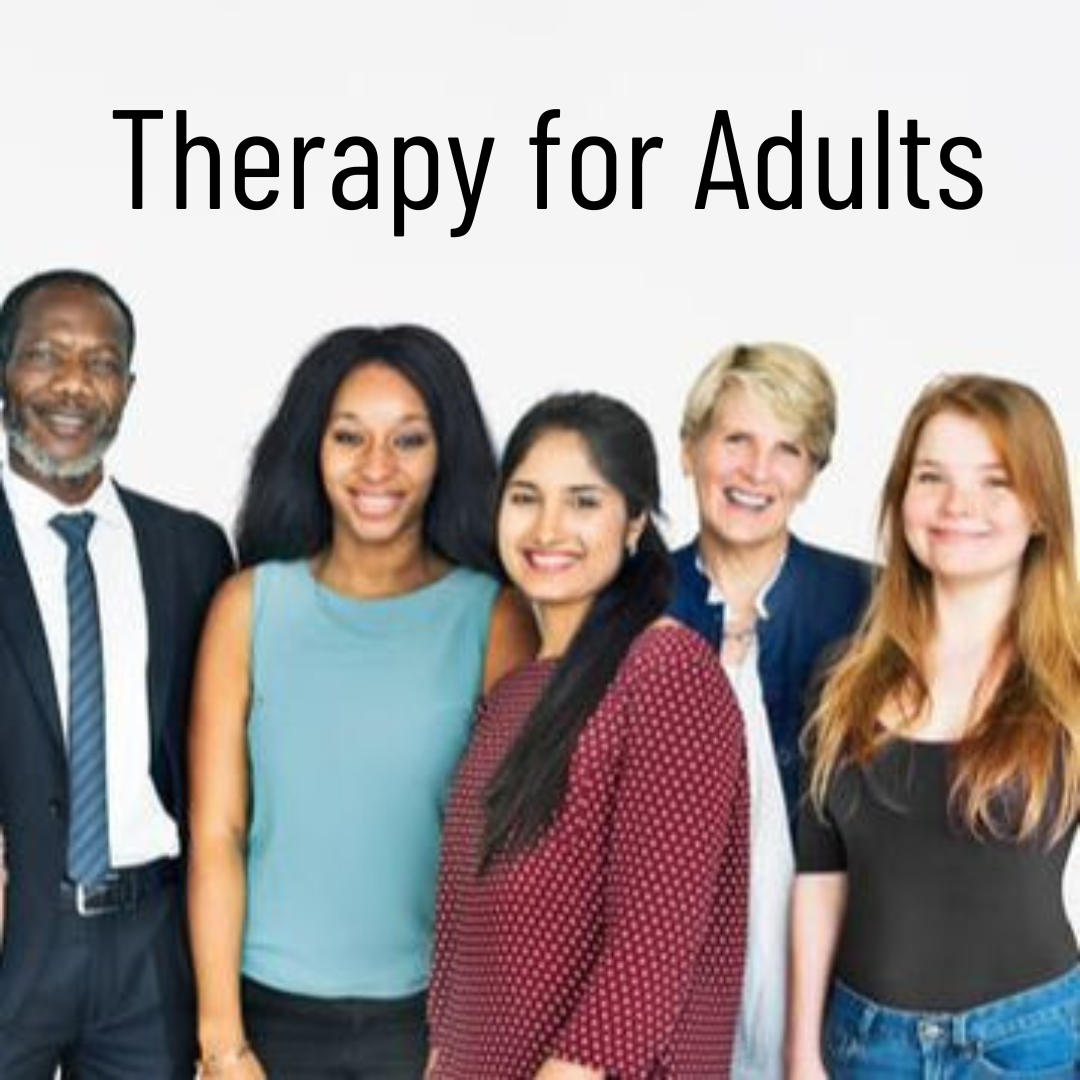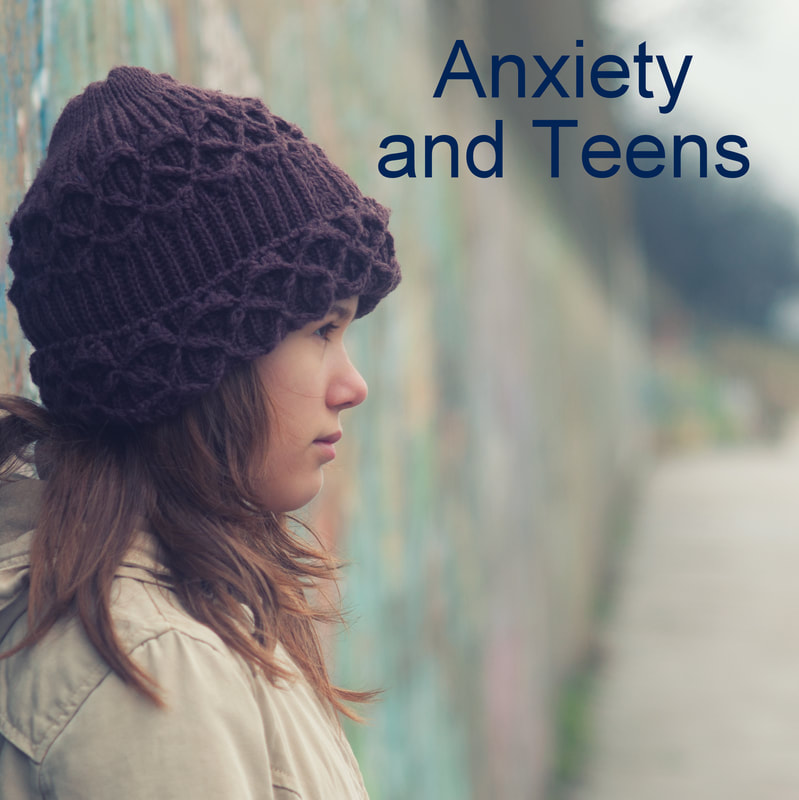What Does Anxiety Look Like for Teenagers?
Adolescence is a phase of life that is naturally permeated with developmental stress. Teens must navigate increased academic demands, biological and hormonal changes, worries about fitting in or being liked, friendship, dating, peer pressure, identity, self-esteem, and much more. They are striving for independence, but at the same time they are in need of communication and support.
As you can imagine, with all of this going on it is expected for teens to have anxious moments. Phases of anxiety are short term, and often occur along with environmental stressors, such as during conflicts with friends, before new experiences, or when preparing for a high pressure situation such as final exams. Teens are typically resilient and can often bounce back from difficult emotions. When anxiety becomes overwhelming however, it can produce chronic symptoms that require a significant amount of energy to manage or that may prevent them from functioning as fully as they are able.
Let's Take a Look at Some of the Most Common Anxiety Symptoms in Adolescence:
Adolescence is a phase of life that is naturally permeated with developmental stress. Teens must navigate increased academic demands, biological and hormonal changes, worries about fitting in or being liked, friendship, dating, peer pressure, identity, self-esteem, and much more. They are striving for independence, but at the same time they are in need of communication and support.
As you can imagine, with all of this going on it is expected for teens to have anxious moments. Phases of anxiety are short term, and often occur along with environmental stressors, such as during conflicts with friends, before new experiences, or when preparing for a high pressure situation such as final exams. Teens are typically resilient and can often bounce back from difficult emotions. When anxiety becomes overwhelming however, it can produce chronic symptoms that require a significant amount of energy to manage or that may prevent them from functioning as fully as they are able.
Let's Take a Look at Some of the Most Common Anxiety Symptoms in Adolescence:
Anxiety is tricky because it can present in many ways. Sometimes it may be triggered by something small and then slowly generalize into other areas. For example, imagine an incident where a person becomes embarrassed by dropping their lunch in the cafeteria. This becomes learned and stored in memory as an emotional trigger. The teen becomes motivated to avoid that trigger in the future, leading to a strong desire to skip school or stay away from the cafeteria. By avoiding the trigger, the teen's emotional association goes unchallenged and is reinforced over time. The more triggers that the teen tries to avoid, the more worried they become.
Some people who become anxious may also experience panic attacks. Not all anxious teens experience panic symptoms, and some experience mild symptoms of panic without enduring a full panic attack. Symptoms that occur during a panic attack include:
Any time your child is experiencing physical symptoms, we strongly recommend that they visit their pediatrician first to rule out any medical issues. If their doctor agrees that the symptoms may be caused by anxiety, then it's time to talk about treatment.
What Does Treatment Look Like for Teens With Anxiety?
The key to overcoming anxiety involves supportive collaboration between the therapist, teen, and parents as the teen learns to challenge their worries and live more freely. As with any health issue, the first step in treatment is accurate diagnosis. The diagnosis provides clarity regarding your teen’s struggles and shapes the direction of treatment.
Thankfully, anxiety is very treatable through psychotherapy. Cognitive Behavioral Therapy is most commonly used for anxiety and is a highly effective treatment approach. Neurofeedback and mindfulness are options that may incorporated for additional support. In more severe cases, we may also provide referrals for medication to support your teen’s functioning.
As your teen begins therapy for anxiety, they will learn to:
Teenagers who receive treatment for anxiety have the added benefit of a therapist who can help them balance their need for independence and for family support. Therapy allows them to share their worries freely without mom or dad hearing about things considered more private. At the same time, their therapist can help them to improve communication with parents and better utilize their support system. After you schedule your first session, we will meet together to decide what boundaries we might set on information shared throughout the treatment process.
If your teen appears to be struggling with anxiety that interferes with school, friendships, family relationships, or other areas of daily functioning, it’s important to get them evaluated and treated as soon as possible. Anxiety that goes untreated may lead your teen to be at higher risk for other problems, such as depression, substance abuse, academic difficulties, and social hardship. Anxiety is treatable, and most teens can learn to cope with and manage their anxiety effectively and independently.
Anxiety is tricky because it can present in many ways. Sometimes it may be triggered by something small and then slowly generalize into other areas. For example, imagine an incident where a person becomes embarrassed by dropping their lunch in the cafeteria. This becomes learned and stored in memory as an emotional trigger. The teen becomes motivated to avoid that trigger in the future, leading to a strong desire to skip school or stay away from the cafeteria. By avoiding the trigger, the teen's emotional association goes unchallenged and is reinforced over time. The more triggers that the teen tries to avoid, the more worried they become.
Some people who become anxious may also experience panic attacks. Not all anxious teens experience panic symptoms, and some experience mild symptoms of panic without enduring a full panic attack. Symptoms that occur during a panic attack include:
- Rapid heartbeat
- Sweating and trembling
- Dizziness
- Upset stomach
- Difficulty breathing
- Chest pain
- Feeling like they’re dying
- Feeling like they’re “going crazy”
- Numbness or tingling in arms and legs
- Derealization.
Any time your child is experiencing physical symptoms, we strongly recommend that they visit their pediatrician first to rule out any medical issues. If their doctor agrees that the symptoms may be caused by anxiety, then it's time to talk about treatment.
What Does Treatment Look Like for Teens With Anxiety?
The key to overcoming anxiety involves supportive collaboration between the therapist, teen, and parents as the teen learns to challenge their worries and live more freely. As with any health issue, the first step in treatment is accurate diagnosis. The diagnosis provides clarity regarding your teen’s struggles and shapes the direction of treatment.
Thankfully, anxiety is very treatable through psychotherapy. Cognitive Behavioral Therapy is most commonly used for anxiety and is a highly effective treatment approach. Neurofeedback and mindfulness are options that may incorporated for additional support. In more severe cases, we may also provide referrals for medication to support your teen’s functioning.
As your teen begins therapy for anxiety, they will learn to:
- Communicate better with parents and teachers
- Focus more effectively
- Develop stronger coping skills
- Quiet their thoughts and be mindful
- Identify and regulate their emotions
- Experience increased confidence and happiness
Teenagers who receive treatment for anxiety have the added benefit of a therapist who can help them balance their need for independence and for family support. Therapy allows them to share their worries freely without mom or dad hearing about things considered more private. At the same time, their therapist can help them to improve communication with parents and better utilize their support system. After you schedule your first session, we will meet together to decide what boundaries we might set on information shared throughout the treatment process.
If your teen appears to be struggling with anxiety that interferes with school, friendships, family relationships, or other areas of daily functioning, it’s important to get them evaluated and treated as soon as possible. Anxiety that goes untreated may lead your teen to be at higher risk for other problems, such as depression, substance abuse, academic difficulties, and social hardship. Anxiety is treatable, and most teens can learn to cope with and manage their anxiety effectively and independently.
Ready to get started? Call, email us, or make an appointment online.
Use Our Intelligent, Real-Time Scheduling System To Search Our Availability and Request An Appointment.



















